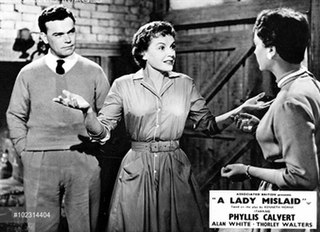Related Research Articles

A Lady Mislaid is a 1958 British comedy film directed by David MacDonald and starring Phyllis Calvert, Alan White and Thorley Walters. It is based on a 1948 play of the same name by Kenneth Horne.

The Great Lover is a 1931 American pre-Code romantic drama film directed by Harry Beaumont and starring Adolphe Menjou and Irene Dunne. The supporting cast includes Ernest Torrence, Neil Hamilton and Olga Baclanova. It as produced and distributed by Metro-Goldwyn-Mayer and based on the 1915 The Great Lover by Leo Ditrichstein. Dunne was loaned from RKO for the film.
Road House is a 1934 British comedy crime film directed by Maurice Elvey and starring Violet Loraine, Gordon Harker and Aileen Marson.

The Story of Shirley Yorke is a 1948 British drama film directed by Maclean Rogers and starring Derek Farr, Dinah Sheridan and Margaretta Scott. The film was based on the play The Case of Lady Camber by Horace Annesley Vachell. It was made at the Nettlefold Studios in Walton-on-Thames. Art direction was by Charles Gilbert.

East Lynne is a 1925 American silent drama film directed by Emmett J. Flynn and starring Alma Rubens, Edmund Lowe, and Lou Tellegen. The film is based on the bestselling 1861 Victorian novel of the same name by Ellen Wood. The scenario was written by Lenore Coffee and the film's director, Emmett J. Flynn.
Tommy Atkins is a 1915 British silent war film directed by Bert Haldane and starring Blanche Forsythe, Jack Tessier and Roy Travers. It is based on an 1895 play of the same title by Ben Landeck and Arthur Shirley.
Jack Tar is a 1915 British silent war film directed by Bert Haldane and starring Jack Tessier, Eve Balfour and Thomas H. MacDonald. An Admiral's daughter goes undercover in Turkey to help a British agent thwart a German plot during the First World War.

Samson is 1936 French drama film directed by Maurice Tourneur and starring Harry Baur, Gaby Morlay and André Lefaur. It was based on the 1908 play of the same title by Henri Bernstein, which had previously been made into three silent films. The film was shot at the Joinville Studios in Paris, with sets designed by the art director Guy de Gastyne.
Lady Jennifer is a 1908 novel by the British writer John Strange Winter. It was adapted into a 1915 British silent film of the same title starring Harry Royston.
Harry Royston (1864-1941) was a British stage and film actor. He appeared in more than sixty short and feature films during the silent era including Lady Jennifer.
Shadows of a Great City is a 1913 British silent crime film directed by Frank Wilson and starring Alec Worcester, Chrissie White and Harry Royston. It is an adaptation of the 1884 play The Shadows of a Great City by Herbert Blaché and Aaron Hoffman. An American film adaptation was made two years later.
After Dark is a 1915 British silent crime film directed by Warwick Buckland and starring Flora Morris, Harry Royston and Harry Gilbey. It is an adaptation of the 1868 play of the same name by Dion Boucicault.
A Daughter in Revolt is a 1927 British silent comedy film directed by Harry Hughes and starring Mabel Poulton, Edward O'Neill and Lilian Oldland.

Little Lord Fauntleroy is a 1914 British silent drama film directed by Floyd Martin Thornton and starring H. Agar Lyons, Gerald Royston in the title role, and Jane Wells. It was based on the 1886 novel "Little Lord Fauntleroy" by Frances Hodgson Burnett. The film was produced by the Natural Colour Kinematograph Company. It was distributed in the UK by Kineto Ltd. and released in the US by Shubert Feature Film in April of that year. It was one of the first feature-length films to be made in colour, using the Kinemacolor two-colour additive colour process.
Belonging is a 1922 British silent crime film directed by Floyd Martin Thornton and starring Hugh Buckler, Barbara Hoffe and William Lenders. The film's direction is sometimes alternatively credited to George Ridgwell.

The Gay Lord Quex is a lost 1919 American silent comedy film directed by Harry Beaumont and starring Tom Moore, Gloria Hope, and Naomi Childers It is based on the 1899 play The Gay Lord Quex by the British writer Arthur Wing Pinero.

An Old Sweetheart of Mine is a 1923 American silent drama film directed by Harry Garson and starring Elliott Dexter, Helen Jerome Eddy, and Lloyd Whitlock.

Marriage of Convenience is a 1960 British crime film directed by Clive Donner and starring Harry H. Corbett, John Cairney and John Van Eyssen. Part of the long-running series of Edgar Wallace Mysteries films made at Merton Park Studios, it is based on the 1924 novel The Three Oak Mystery.

Captain Swift is a 1920 American silent drama film directed by Tom Terriss and Chester Bennett and starring Earle Williams, Florence Dixon and Edward Martindel. It is based on the 1898 play of the same title by C. Haddon Chambers.

Lights Out is a 1923 American silent crime drama film directed by Alfred Santell and starring Ruth Stonehouse, Walter McGrail and Theodore von Eltz. It is based on the 1922 play Lights Out by Paul Dickey and Mann Page, later adapted into the 1938 film Crashing Hollywood. The remake was more light-hearted than the melodramatic tone of the original.
References
- ↑ Goble p.506